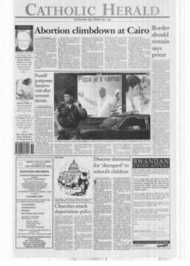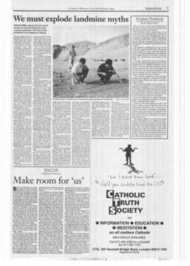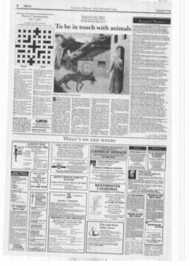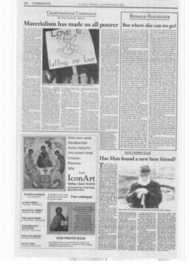Page 6, 9th September 1994
Page 6
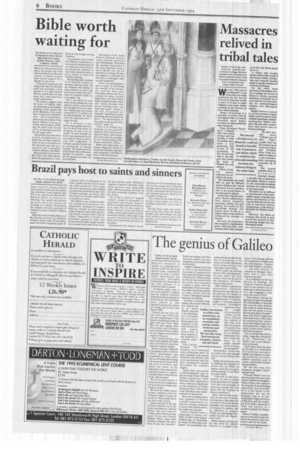
Report an error
Noticed an error on this page?If you've noticed an error in this article please click here to report it.
Tags
Share
Related articles
Priest-writer Who Rescued The Saints
Books Of The Month
Galileo Was Not Persecuted Pontifical Academy Prenares...
Doubts
Galileo Praised During Pope's Visit To Pisa
The genius of alileo
RESTON'S BIOGRAPHY OF Galileo is a gripping introduction to the man, his works and his time; unabashedly populist in style, it is nevertheless meticulously well constructed, thoroughly researched and deserving of the wide audience it so evidently seeks to attract.
As Reston makes clear, it was both Galileo's tragedy and the Catholic Church's misfortune that he happened to be born in "the most disastrous century in (the Church's) history, the century of Luther and Calvin and Henry WII".
Indeed, he was born the very same year (1564) that saw the establishment of the Index of prohibited books; he died while the Thirty Years War was still raging, while Protestants and Catholics were locked in bloody conflict for the religious and political control of Europe.
This scarcely excuses, but does in part explain, the Papal and ecclesiastical paranoia unleashed against Galileo.
Reston succeeds brilliantly in bringing to life a world in which unorthodoxy was punishable by death, where the use of torture and burning was sanctioned for the good of the souls of heretics, and where the threat of the Inquisitors' rack menaced any aspiring scientist or controversialist whose works fell foul of the official censor.
Reston's achievement is measured by the indignation he succeeds in arousing in the modern reader.
He treats the Galileo case as an early equivalent of the sort of human rights violation we are all too depressingly familiar with in this century.
Galileo fell foul of the cast of mind summed up by his near-contemporary, Samuel Butler, who once wrote of "errant saints whom all men grant! To he true Church Militant/ Who... prove their doctrine orthodox/ By apostolic blows and knocks." Butler was writing of the Presbyterians; neither side had a monopoly on doctrinally-justifled brutality.
Galileo's ultimate crime was to hold to the heliocentric discoveries of Copernicus at a time when the Church, having established by biblical exegesis that the sun moved round the earth, was tentatively coming to grips with the implications of the new learning, whilst remaining opposed to public debate until the "correct" theological response had been formulated.
Contrary to popular imagination, the counter-reforma tion Church was by no means wholly opposed to the dissemination of scientific knowledge; Reston gives due emphasis to the sad irony that the 16th century church was, in many respects, at the forefront of scientific exploration.
The Collegic Romano, fox instance, was a renowned centre of learning, where "as pure scientists and mathematicians (the Jesuits) were as yet unconcerned with 'the great consequences' of these discoveries for Catholic dogma".
Galileo first encountered Cardinal Barberini, later to become Pope Urban VIII and Galileo's persecutor, when Barberini latter expressed a wish to witness an experiment on the properties of bodies floating in water. The Servite order included many mathematicians of distinction.
And, just as leading clerics were prepared to honour scientific achievement, so were the scientists prepared to honour the Church and to live within her precepts.
Galileo himself made a pilgrimage to Loreto, for whilst his life's work hinged, as Reston says, on "promoting the virtues of observation over dogma", he nevertheless saw nothing fundarnen y incredible or inCongruo s in the notion of a small, P estinian hovel going airb rne and choosing to land in taly.
Reston paints an arresting picture of the menta gymnastics into which t e early modern mind was reed by the emergence of visible, natural phenomena After Galileo's m entous astronomical dis overies following his manuf cture of the telescope, the Church, in the form of the eminent Jesuit mathematician Fr Clavius, sought to reconcile science and scripture: "Of Galileo's assertioll
mount inous surface of the moon, lavius was cre five: if that we e true, then the itInoon's irregul rities must be encased by an invisible, transparelint crystal to return the moon o its perfect, mooth polish as Scripture demanded."
Nevertheless, Clavius was an honest and open enough man to concede defea in the end.
Galileo himself had o wish to challenge the auth rity of divine writ; the Bi le, he argued, never lied, bu man's understanding of the Word was often faulty.
"The task of wise interpreters", he wrote in letter
to his close friend, Fr telli, "is to find true mean gs or scriptural passage th t will agree with the evidex ce of sensory experience".
Alas, it was too late, lineally, for any such reco ciliatory exercise to take pla e; the Council of Trent had a eady forbidden the interpre ation of scripture by layme and by dabbling in exegesis Galileo was gravitating linexorably towards the Inquisition's orbit.
Reston argues a strong case for the need for today's Church to recognise the extent of the damage inflicted by its treatment of Galileo and the heliocentrists. "Science and faith clashed", he writes, "... and were severed, to continue in divergent directions and to lose their common ground."
In its insistence on the total victory of theology, the Catholic Church branded itself to the modern day as antiscience and obscurantist. It is still struggling to overcome the curse of 1616.
"And science, fearing the spiritual, became increasingly dry and bloodless, to the point that even the most fantastic discoveries in today's heavens have lost the power to move the soul and spirit of mortals," Pope John Paul H addressed these questions in 1988, when he commented that "science can purify religion from error and superstition: religion can purify science from idolatry and false absolutes."
It is no wonder that there is, today, a large fan club known as the "Galileistas", for Galileo was a true Renaissance polymath.
Quite apart from the time he devoted to a verification of Copernican astronomy, Galileo was known as a firstrate polemicist, an accomplished musician and, of course, a great mathematician and geometrist.
He was also testy, foul tempered, arrogant, charming and loyal.
Through Resto's eyes we also encounter the lesser stars around Galileo; his daughter, Marie-Celeste, who organises the removal of incriminating papers from his rooms while he is in the hands of the Inquisition; the spy de Dominis, who is in turn Archbishop of Split and Dean of Windsor, and the outspoken Friar Sarpi, opponent of Trent and survivor of a murderous attack by Vatican agents.
Reston's Galileo, outstanding as an evocative study of a man in his period, is also very much a tract for our times.
blog comments powered by Disqus


